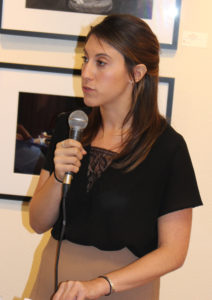ROUND ROCK—“The darkest memories produce rays of light,” Sofi Hersher, a staff member of the Religious Action Center of Reform Judaism, told an interfaith gathering sponsored by a Texas Baptist church in Round Rock.
Synagogue arson

In her darkest memory, Hersher is 9 years old, watching her synagogue engulfed in flames. Now, from the perspective of 18 years, she realizes her hometown, Sacramento, Calif., “became a better place to live than it was before” two brothers torched Congregation B’nai Israel and two other synagogues.
Hersher and panelists from five other faiths conducted “a conversation on religious liberty,” sponsored by Peace of Christ Church, a congregation affiliated with the Baptist General Convention of Texas and the Cooperative Baptist Fellowship in Round Rock.
The event was the latest installment in a series of interfaith discussions—two each in the fall and spring—the church convenes in the booming, increasingly diverse community north of Austin, Pastor Kyle Tubbs noted.
“I remember people hated me. … Why? Because we’re Jewish,” Hersher recalled. “I felt the rise of fear because of religious bigotry.”
Jews are the target of 56 percent of hate crimes in the United States, although they comprise just 2 percent of the population, noted Hersher, the first non-Baptist fellow of the Baptist Joint Committee for Religious Liberty.
‘People fear what they don’t understand’
Ignorance, in the form of religious illiteracy, fans the flames of religious violence, she insisted, adding, “People fear what they don’t understand and hate what they can’t conquer.”
Although Article VI of the U.S. Constitution, the First Amendment and multiple subsequent laws protect religious liberty, many Americans still seek to limit the freedom of others, she said.
“At its most basic, religious liberty is the freedom to believe anything you want,” Hersher explained. And the best, most practical way to protect religious liberty is “to get to know each other and protect each other’s rights,” she added.
Sign up for our weekly edition and get all our headlines in your inbox on Thursdays
That happened in Sacramento after the synagogue arsons, she reported, describing beautiful childhood memories, when her community rallied to support Jews devastated by the synagogue fires. Those expressions of interfaith unity taught her an important life lesson: “We, too, can build a better world.”
Panelists offer varied perspectives
After Hersher’s keynote address, she and other panelists discussed how religious liberty is a theme imbedded in various faith traditions.
Despite popular opinion to the contrary, Islam supports religious liberty, stressed Mohamed-Umer Esmail, imam of the Nueces Mosque in Austin, who also ministers to students at the University of Texas at Austin.
“There is room for religious liberty in Islam. Everyone can practice their own faith,” Esmail said. To illustrate, he described how the Prophet Muhammad allowed not only his followers, but also Jews and pagans to operate their own legal systems and courts in territory he controlled.
Also, Esmail discussed Sharia law, which some Americans fear could supplant U.S. laws.
“Sharia applies differently, depending upon where people live,” he explained, comparing it to the U.S. Constitution. For example, the Constitution does not apply to citizens of other countries living in their countries. Similarly, Sharia does not apply to non-Muslims living in the United States or other non-Muslim nations.
“Religious liberty is founded on the inviolability of each human conscience,” said Uche Ande, a native of Nigeria and pastor of St. Margaret Catholic Church in Giddings, citing “On Human Dignity,” a document produced by the Second Vatican Council more than 50 years ago. “Inviolable dignity is given by God to each person,” he said.
Conversely, the concept of religious toleration “has caused more harm than good,” Ande added. Toleration implies religious practice is a privilege, which can be revoked or taken away, he explained, while religious liberty is a divine right.
Need to respect others
Religious liberty is vital because of its link to respect, said David Zuniga, a Zen Buddhist priest and psychologist in Austin.
“Religion can both alleviate and cause suffering,” Zuniga acknowledged. He described his own pain when a U.S. president said atheists are not “true Americans,” and yet his uncle, a Navy SEAL, sacrificed his life for his country.
“It’s important to respect others” of all faiths and no faith, he said.
Similarly, government decisions to favor one religion over others are unwise, added Jagannath Vedula, a founding trustee of Austin Hindu Temple and Community Center.
“This is an era when we are trying to value all religions equally,” Vedula said. “The ideal is government without any favoritism of religion.”
“This topic is one that makes me proud to be a Baptist,” said Aurelia Davila Pratt, pastor of spiritual formation at Peace of Christ Church. “The Baptist tradition was founded on religious freedom.”
Pratt described how Thomas Helwys, one of the two founders of the first Baptist church in the 17th century, staked a claim for religious liberty. He confronted King James 1 of England, championing absolute religious freedom, as did his New World counterpart, Roger Williams, who founded the first Baptist church in America.
“Baptists historically have advocated religious liberty for all people,” she said. Quoting Martin Luther King Jr., she added: ‘Injustice anywhere is a threat to justice everywhere.’ … People of faith must stand together.”
















We seek to connect God’s story and God’s people around the world. To learn more about God’s story, click here.
Send comments and feedback to Eric Black, our editor. For comments to be published, please specify “letter to the editor.” Maximum length for publication is 300 words.